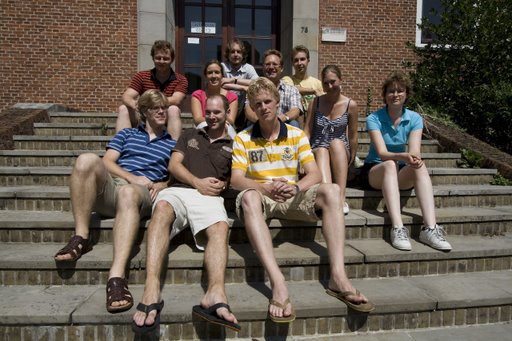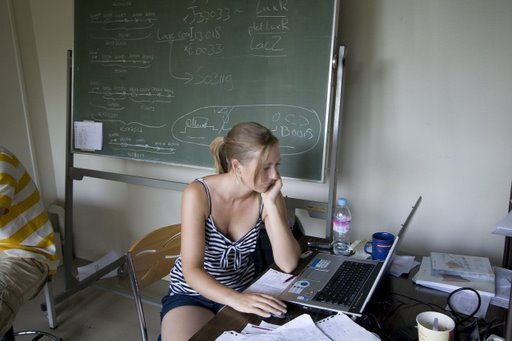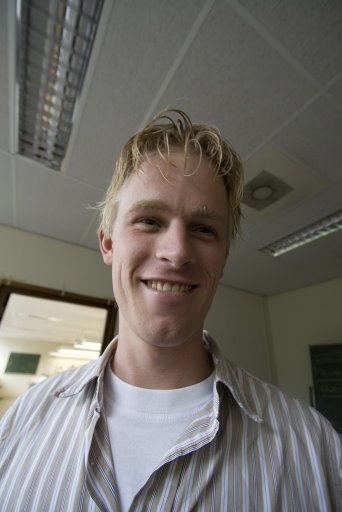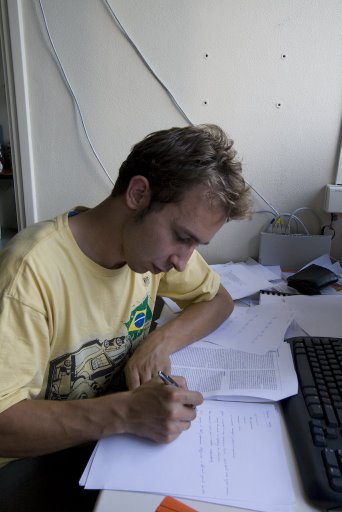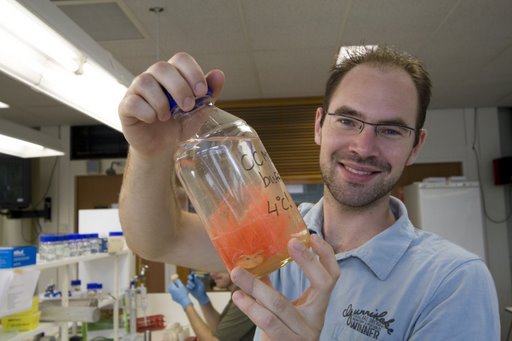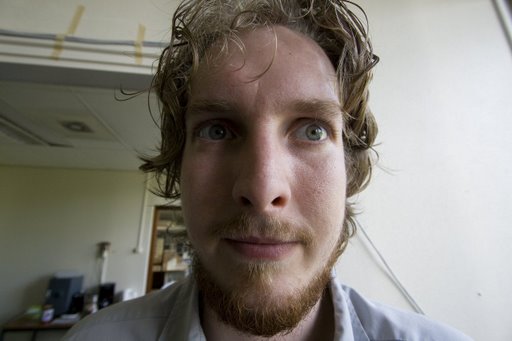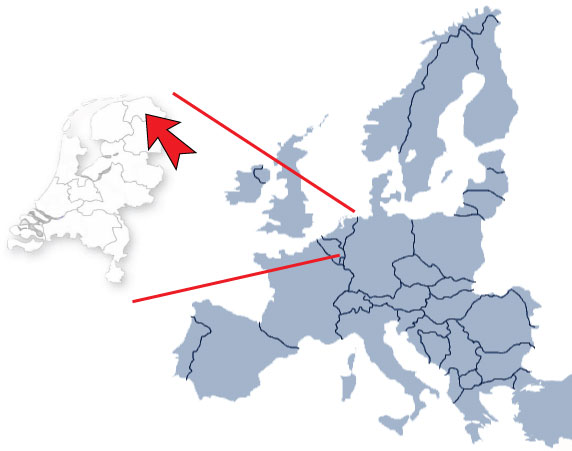Team:Groningen/Team
From 2008.igem.org
(→Who we are) |
Aukevanheel (Talk | contribs) (→The Team) |
||
| (135 intermediate revisions not shown) | |||
| Line 1: | Line 1: | ||
| - | <!-- | + | __NOTOC__ |
| + | <div style="width: 700px; margin-left: 15px; float:right;"> <html><!-- main content div --></html> | ||
| - | + | == '''The Groningen Transformers''' == | |
| - | + | ||
| - | + | ||
| - | + | ||
| - | + | ||
| - | + | ||
| - | + | ||
| - | + | ||
| - | + | ||
| - | + | ||
| - | + | ||
| - | + | ||
| - | + | ||
| - | + | Somewhere in the north of the Netherlands, the Groningen Transformers are busy working on their brilliant plans. Here in the lab, our mascot “Edje”, a plush giant E. coli microbe, is keeping an eye on our daily work in the labs and keeps us from throwing our computers out the window whenever Matlab and Clone Manager are giving us a hard time. At the end of the days, we like to play little sports tournaments or go to the movies, good and REALLY bad movies. After all, our iGEM summer project will be enjoyable :). | |
| + | <!--- The Mission, Experiments ---> | ||
| - | {| | + | {|border = "0" |
| - | + | ||
| - | + | ||
|- | |- | ||
| - | | | + | |rowspan="3"| |
| - | '' | + | |
| - | + | =='''The Team'''== | |
| - | + | [[Image:Groupfoto.jpg|700px|left|frame|Enjoy the sun!]] | |
| - | + | ||
| - | + | ||
| - | + | ||
| + | |||
| + | |||
| + | |||
| + | |||
| + | |||
| + | |||
| + | |||
| + | |||
| + | |||
| + | |||
| + | |||
| + | |||
| + | |||
| + | |||
| - | |||
| - | |||
| - | |||
| - | |||
| - | |||
| - | |||
| - | |||
| - | |||
| - | |||
| - | |||
| - | |||
| - | |||
| - | |||
| - | |||
| Line 54: | Line 42: | ||
| - | |||
| - | |||
| - | |||
| - | |||
| - | |||
| - | |||
| - | |||
| - | |||
| - | |||
| - | |||
| - | |||
| - | |||
| - | |||
| - | |||
| - | |||
<gallery> | <gallery> | ||
| - | + | Our team of students: | |
| - | Image: | + | Image:Annelieke.jpg|'''Annelieke de Wit''': Master Life Science & Technology |
| - | Image: | + | Image:Auke.jpg|'''Auke van Heel''': Master Molecular Biology |
| - | Image: | + | Image:Floor.jpg|'''Floor Hugenholtz''': Master Molecular Biology |
| - | + | Image:Mirjam.jpg|'''Mirjam Boonstra''': Bachelor Molecular Biology | |
| - | Image: | + | Image:Martijn.jpg|'''Martijn Herber''': Master Molecular Biology |
| - | Image: | + | Image:Ruud.jpg|'''Ruud Detert Oude Weme''': Master Chemistry |
| - | Image: | + | Image:Sander.jpg|'''Sander Onur''': Master Physics |
| - | Image: | + | Image:Sjoerd.jpg|'''Sjoerd van der Meulen''': Master Molecular Biology |
| - | Image: | + | Image:Tiemen.jpg|'''Tiemen Rozeboom''': Master Computer Science |
| - | Image: | + | Image:Lab.jpg|'''Our Lab''' |
| - | Image: | + | |
</gallery> | </gallery> | ||
|} | |} | ||
| + | '''Advisors:''' | ||
| - | + | *''' Advisor 1''': Prof. Dr. Oscar Kuipers | |
| + | Head of the [http://molgen.biol.rug.nl molecular genetics group] at the [http://www.rug.nl University of Groningen]. | ||
| + | *''' Advisor 2''': Prof. Dr. Roel Bovenberg | ||
| - | + | == '''University of Groningen''' == | |
| + | The University of Groningen has a long academic tradition extending back to 1614, which makes Groningen the oldest university in the Netherlands after Leiden. The founding of the university – at that time still a college of higher education – was an initiative taken by the Regional Assembly of the city of Groningen and the Ommelanden (surrounding region). There were four faculties – Theology, Law, Medicine and Philosophy. The first 75 years of its existence were very fruitful for the university with about 100 students enrolling every year. In 1815, at the same time as Leiden and Utrecht, the university gained recognition as a national college of higher education, but this was followed by discussions about closure. The situation improved markedly when a new main university building 'the Academiegebouw' (see picture on home-page) was constructed in 1850, a building that was largely financed by the people of Groningen. This made the fire that completely destroyed this building in 1906 even more poignant. When the university celebrated its first 300 years in 1914 there were 611 registered students; this had already grown to 1000 by 1924. After a drop back during the Depression, and in particular during the Second World War, the number of students grew rapidly from 1945 to reach 20,000 in 1994. At the present time there are about 21,000 students registered at the University of Groningen with the number of foreign students again growing steadily. | ||
== '''Where we're from''' == | == '''Where we're from''' == | ||
| - | Groningen | + | Groningen is a town in the north of the Netherlands. |
| + | [[Image:RUG_location.jpg|700px|left|frame|]] | ||
| + | |||
| + | |||
| + | |||
| + | |||
| + | |||
| + | |||
| + | |||
| + | |||
| + | |||
| + | |||
| + | |||
| + | |||
| + | |||
| + | |||
| + | |||
| + | |||
| + | |||
| + | |||
| + | |||
| + | |||
| + | |||
| + | |||
| + | |||
| + | |||
| + | |||
| + | |||
| + | |||
| + | |||
| + | |||
| + | |||
| + | |||
| + | |||
| + | |||
| + | |||
| + | |||
| + | |||
| + | |||
| + | |||
| + | |||
| + | |||
| + | == '''Funding of the team 2008''' == | ||
| + | |||
| + | For the 2008 team of the groningen university funds where acquired from Gratama foundation , Biotechnology fund Netherlands (SBN, Stichting biotechnologie nederland),[http://www.centreforsyntheticbiology.eu/ Centre for synthetic biology groningen], [http://www.rug.nl/gbb/index Groningen Biomolecular Sciences and Biotechnology Institute], [http://www.rug.nl/zernike/index Zernike institute for advanced materials], [http://www.rug.nl/edrec/onderzoek/Onderzoeksgroepen/stratinghInstitute Stratingh institute for Chemistry] and the commercial company [http://www.DSM.com DSM]. | ||
| + | |||
| + | </div><!-- CLOSE main content div --> | ||
| + | |||
| + | [[Image:ruglog.png|200px|left]] | ||
| + | |||
| + | <div id='left-sidebar'> | ||
| + | {| style="color:white;background-color:#dd0000;link:white;" cellpadding="5" cellspacing="2" border="1" bordercolor="white" width="25%" align="left" | ||
| + | |align="left"|[[Team:Groningen|<font color=white>Home</font>]] | ||
| + | |- | ||
| + | |align="left"|[[Team:Groningen/Team|<font color=white>The Team</font>]] | ||
| + | |- | ||
| + | |align="left"|[[Team:Groningen/Project|<font color=white>The Project</font>]] | ||
| + | |- | ||
| + | |align="left"|[[Team:Groningen/Parts|<font color=white>Parts</font>]] | ||
| + | |- | ||
| + | |align="left"|[[Team:Groningen/Modeling|<font color=white>Modeling</font>]] | ||
| + | |- | ||
| + | |align="left"|[[Team:Groningen/Notebook|<font color=white>Notebook</font>]] | ||
| + | |} | ||
Latest revision as of 15:59, 16 September 2008
The Groningen Transformers
Somewhere in the north of the Netherlands, the Groningen Transformers are busy working on their brilliant plans. Here in the lab, our mascot “Edje”, a plush giant E. coli microbe, is keeping an eye on our daily work in the labs and keeps us from throwing our computers out the window whenever Matlab and Clone Manager are giving us a hard time. At the end of the days, we like to play little sports tournaments or go to the movies, good and REALLY bad movies. After all, our iGEM summer project will be enjoyable :).
The Team
|
Advisors:
- Advisor 1: Prof. Dr. Oscar Kuipers
Head of the [http://molgen.biol.rug.nl molecular genetics group] at the [http://www.rug.nl University of Groningen].
- Advisor 2: Prof. Dr. Roel Bovenberg
University of Groningen
The University of Groningen has a long academic tradition extending back to 1614, which makes Groningen the oldest university in the Netherlands after Leiden. The founding of the university – at that time still a college of higher education – was an initiative taken by the Regional Assembly of the city of Groningen and the Ommelanden (surrounding region). There were four faculties – Theology, Law, Medicine and Philosophy. The first 75 years of its existence were very fruitful for the university with about 100 students enrolling every year. In 1815, at the same time as Leiden and Utrecht, the university gained recognition as a national college of higher education, but this was followed by discussions about closure. The situation improved markedly when a new main university building 'the Academiegebouw' (see picture on home-page) was constructed in 1850, a building that was largely financed by the people of Groningen. This made the fire that completely destroyed this building in 1906 even more poignant. When the university celebrated its first 300 years in 1914 there were 611 registered students; this had already grown to 1000 by 1924. After a drop back during the Depression, and in particular during the Second World War, the number of students grew rapidly from 1945 to reach 20,000 in 1994. At the present time there are about 21,000 students registered at the University of Groningen with the number of foreign students again growing steadily.
Where we're from
Groningen is a town in the north of the Netherlands.
Funding of the team 2008
For the 2008 team of the groningen university funds where acquired from Gratama foundation , Biotechnology fund Netherlands (SBN, Stichting biotechnologie nederland),[http://www.centreforsyntheticbiology.eu/ Centre for synthetic biology groningen], [http://www.rug.nl/gbb/index Groningen Biomolecular Sciences and Biotechnology Institute], [http://www.rug.nl/zernike/index Zernike institute for advanced materials], [http://www.rug.nl/edrec/onderzoek/Onderzoeksgroepen/stratinghInstitute Stratingh institute for Chemistry] and the commercial company [http://www.DSM.com DSM].
 "
"
